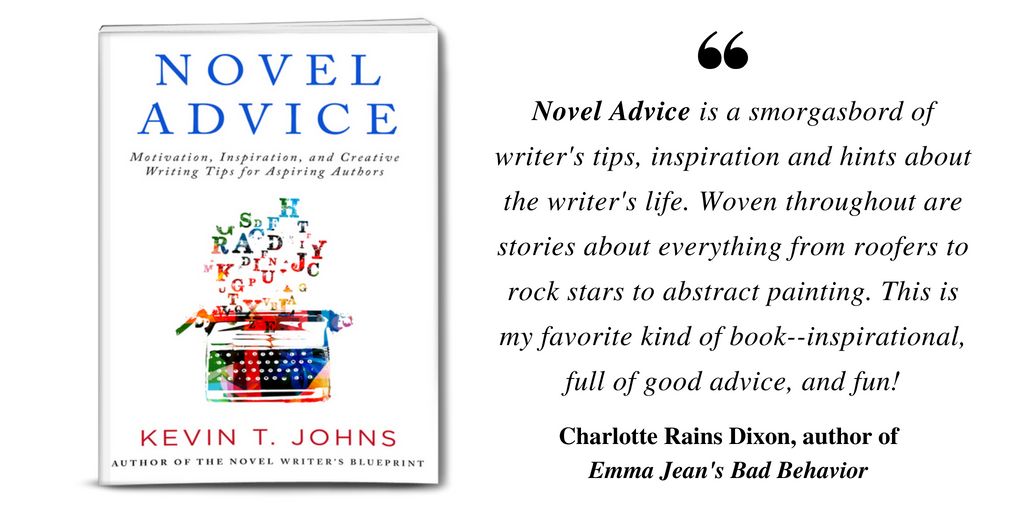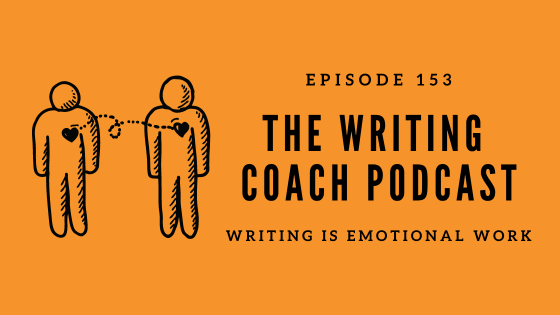In episode 153 of The Writing Coach podcast, writing coach Kevin T. Johns discusses how in creating their art, writers can often stir up memories, traumas, and deep emotions not just within the reader but within themselves as well.
Listen to the episode or read the transcript below:
Podcast: Play in new window | Download
Subscribe: Apple Podcasts | RSS
The Writing Coach Episode #153 Show Notes
Get Kevin’s FREE book: NOVEL ADVICE: MOTIVATION, INSPIRATION, AND CREATIVE WRITING TIPS FOR ASPIRING AUTHORS.

The Writing Coach Episode #153 Transcript
Hello, beloved listeners and welcome back to The Writing Coach podcast. It is your host, as always, writing coach Kevin t Johns here.
Do you want a free book? Everybody loves a free book, right? I have a free book on my website called Novel Advice: Motivation, Inspiration, and Creative Writing Tips for Aspiring Authors. Head on over to www.kevintjohns.com and look for a link that says, “Free Book.” You can sign up, get on my mailing list, and I’ll send you a free copy of Novel Advice.
Now, in today’s episode of the podcast, I’d like to talk a little bit about emotions. I sometimes have clients say to me, “Kevin, since I’ve been working on my book, I’ve been feeling more emotional than normal. Is this, is this part of the process?”
And I believe it is. I think absolutely emotions are key to writing a book.
It’s an emotionally charged art form that we’re working in. You know, the way that a painter you know, a fine artist works with paint. As a writer, we’re working with words, but really we’re working with ideas and emotions. So emotions are kind of like our bread and butter. And so of course, the process of writing can often bring up strong emotions for you as the writer. And you might even be dipping into emotional responses or memories or traumas that you’ve been suppressing or that you weren’t even aware were still within you or that you’d been hiding since childhood writing is a way to connect with readers and to communicate emotions. That’s really what storytelling is all about. And so even if you are not digging into your own emotions or your own traumas or your own emotional history, you’re still writing about events that are hopefully going to create an emotional response in your reader, right?
That’s what storytelling is. It’s putting words together in a way that surprises your reader or sparks empathy, or gives them a sense of intrigue, or in some way resonates with your reader. So in the course of writing a manuscript, it’s almost impossible not to be tapping into emotions on a regular basis. And so, yeah, <laugh>, getting emotional is part of the art form. There’s a saying it goes something like no tears in the writer, no tears in the reader, which is to say, if you are not emotionally moved by your writing, then why would anyone else?
When you tell a story, when you write a book, you are digging into your conscious understanding of the world, of how things work, of how people interact with one another. Ideally, you’ve got a strong controlling idea, a little piece of wisdom that you’re sharing with your reader. So all of this is happening consciously, but at the same time, you’re also pulling from ideas and emotions and memories and things in your subconscious, or you’re creating things in your imagination. And all of this, all of these processes, whether they’re conscious or subconscious, can lead to some personal self-reflection and some moments of introspection. So if you’re finding yourself feeling emotions that aren’t necessarily directly related to what you’re writing about, it still might be a result of the process you’re going through of writing a book. And the amazing thing about writing is that often it can help people process and understand their own thoughts and feelings.
In episode 118 of this show back in November 2021, I interviewed writer Gary Cox and something that was really interesting that always stuck with me from his conversation, is he often, he said, he often doesn’t know what he thinks about a topic until he writes about it, which is kind of the opposite of this conscious idea of, I have a vision, I have a concept, I’m going to share it via writing. He writes, and in doing so, he processes and solidifies his understanding of the world. And in fact, there are writing coaches out there who suggest that writing can actually be part of a healing experience. In fact, I think there’s a general narrative out there in our culture that writing about past traumas is almost certainly going to help heal it. I think the thinking here is that it’s going to be a cathartic experience by releasing your pent-up emotions and feelings via writing, you’re dealing with them in a somewhat controlled manner.
You’re taking these more abstract memories or feelings and making them more concrete by putting them into words, which ideally leads to this sense of relief or release or catharsis. I’ve not found that to be the case. However, as I said, that seems to be the main narrative. Oh, write about your pain, and you’ll feel better about it. As I said, I don’t think so, at least not for me, and not for a lot of the clients that I’ve worked with.
I had a childhood that maybe wasn’t as good as one might have liked. My parents got divorced, I didn’t get along with my stepfather. I got moved from the city to this small country town where I felt like I didn’t fit in.
And so I had a lot of these feelings from my past that when I went and wrote my first book, I worked into the story, you know, the idea of feeling like an outcast in a small town, problems with parents and with stepparents and all of these issues. And I think on some level, I was hopeful that it was going to allow me to release the pain, release the memories, release the trauma, and kind of get over it by turning it into art. But instead, what I found is it just stirred up those old emotions and stirred up bad memories. It reactivated a lot of these bad experiences.
And so this is really one of the risks of our art form. Yes, maybe the process of writing for, for a few out there is a healing process, but I think for a lot of us, writing is an emotionally challenging process, and those challenges aren’t always easy and, and they’re not always good.
I do think we can take positive experiences from it, though. I think by digging into our emotional pasts, by perhaps taking something bad that happened to us and writing about it, I think we’re at least taking a negative thing and turning it into a positive thing, which is art.
There’s so many songs and, and, and musicians and books and, and things that I’ve experienced that were sad and, and angry and expressed all these negative emotions. But as a someone experiencing it, as someone listening to the song, as someone reading the book, it helped me, it helped me feel like I wasn’t alone in my emotions. It, it gave me a way to understand these feelings that I was feeling. And so for those artists when they were dealing with their emotions and putting them into a song or into a book, it might have been a negative experience, but it becomes a positive one because books help people.
Art helps people.
And so if you’re writing a book and, and you’re finding it emotionally challenging, yeah, <laugh>, you’re not alone. We’re all dealing with emotions in our art, and it isn’t always easy. And the takeaway, I kind of want to stress here is that by taking negative emotions or just strong emotions and writing about them and finding an audience and connecting with someone and resonating with them and entertaining them, I mean, that whole experience is a positive thing. But don’t go into writing a book thinking it’s not going to emotionally affect you. It’s emotionally exhausting work, writing a book.
And also don’t go in naively thinking, writing about your own traumas is going to heal them. That’s what therapy is for, right? That’s what cognitive behavioural therapy is for. That’s what all these techniques that professionals use to help people deal with their emotions and deal with their traumas. They’re all so much more effective <laugh> than just sitting down and writing a book and hoping that you’re going come out the other side feeling better.
That’s what I want to leave you with today. Writing a book is emotional. It’s emotionally exhausting. It might stir up bad memories and don’t rely on it to make you heal. I urge you to monitor your emotions and be careful with them while writing. Be kind to yourself, and if you’re feeling seriously bad, talk to someone who can help. Creating art is such an amazing, positive experience, but taking care of your mental health and your emotions is also really, really important.
All right, so I hope you’re feeling good. I hope you’re enjoying your writing. I hope it’s stirring up emotions, but in a way that’s manageable and hopefully can result in a great book if you’re having a hard time. Hey, we all go through challenging periods in our lives, and we get through them with support and with help from others. So don’t try to go it alone. Get the support you need.
That is it for this episode. If you want a copy of my free book, Novel Advice, it’s a book full of essays on writing technique writer’s life, all things writing and creativity. Head on over to www.kevintjohns.com and grab yourself a copy of Novel Advice.
All right, thank you for tuning in to another episode of The Writing Coach podcast. It is always lovely to get to talk to you, so don’t forget to hit subscribe, and I will see you on the next episode of The Writing Coach.






